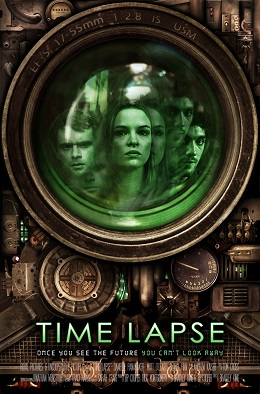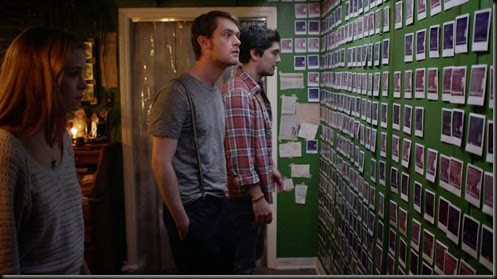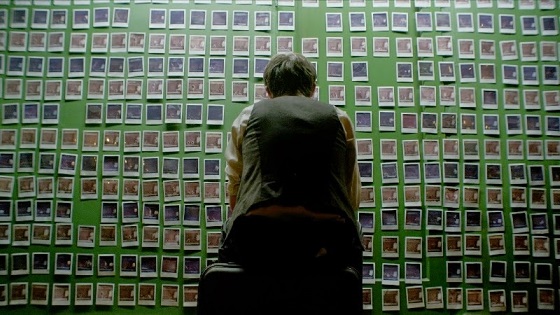[Solid Rock Fist Up]
 A clever mix of Harlan Ellison and Stephen King with just a dash of Poe-esque irony, Bradley King’s Time Lapse is a thrilling delight. The story of three friends who discover that their dead neighbor owned a camera that can take pictures of future events, the film pushes all the right buttons to elicit a tangible sense of excitement, curiosity, and foreboding dread. Interesting without veering off into the complex, the film weaves an engaging web that explores some of the classic consequences of screwing around with the fabric of space-time. Sure, it would be great if one had access to a camera that could reliably provide a snapshot twenty-four hours into the future, yet what happens if a person decides to actively rebel against that fate? Can they? More importantly: should they?
A clever mix of Harlan Ellison and Stephen King with just a dash of Poe-esque irony, Bradley King’s Time Lapse is a thrilling delight. The story of three friends who discover that their dead neighbor owned a camera that can take pictures of future events, the film pushes all the right buttons to elicit a tangible sense of excitement, curiosity, and foreboding dread. Interesting without veering off into the complex, the film weaves an engaging web that explores some of the classic consequences of screwing around with the fabric of space-time. Sure, it would be great if one had access to a camera that could reliably provide a snapshot twenty-four hours into the future, yet what happens if a person decides to actively rebel against that fate? Can they? More importantly: should they?
Time Lapse isn’t afraid to jump into this debate, and wastes little time doing so. The film opens in the apartment of Finn (Matt O’Leary) and Jasper (George Finn), whose ordinary lives seem entirely pleasant (if somewhat financially lean). A painter struggling with a serious case of artist’s block, Finn spends most of his time staring at blank canvasses between maintenance calls to units within his apartment complex. The on-site property manager for his little community, Finn seems mostly happy, if a little frustrated with life, when the movie kicks off.
This happiness is buoyed by an absolute 10 of a girlfriend, Callie (Danielle Panabaker), who is gorgeous, understanding, and supportive. For Christ’s sake: there is a quick cutaway shot early on that shows the woman making and delivering sandwiches to Finn and Jasper whilst the two are playing video games without her. Yet this cozy little utopia is shaken up when Finn learns that their neighbor, just across the courtyard, hasn’t been seen for some time. When they go to check in on the guy, Callie, Finn, and Jasper are floored by their discovery of a camera pointed at their living room window, one that seems to be able to take snapshots of events a day before they transpire.
About the size of a VW Bug, the camera is bolted into the foundation, and has more or less been abandoned by its owner/inventor when Finn and company come upon it. Jasper, a borderline degenerate gambler and pill fiend, is certain that the camera is the answer to all his prayers, and immediately sees the value of keeping the thing and, most importantly, keeping it secret. Finn is more ambivalent, yet when he sees a completed painting in the next day’s picture, his attitude changes, and he and Callie both come on board.
One of the best things Time Lapse has going for it is its pacing, and economy of storytelling. The movie is director Bradley King’s first full-length feature, yet one wouldn’t be able to guess that based solely on the offered product. The story progresses about as you might expect, with fast money and success falling on the heads of our main characters not long after the future-camera comes into their lives, only for jealousy, suspicion, and thoughts of betrayal to sneak into the cinematic stew. Yet none of these developments feels forced or contrived; the plot offers a number of surprising twists that all seem organic in their development, and keep the audience on its toes without taxing their suspension of disbelief all that much.
Sure, when watching this flick, a person might want to scream, “Just break the damn camera. Destroy it! It’s evil!” Yet much of this comes from conditioned hindsight born out of a multitude of Twilight Zone episodes that have explored this territory before. The characters in Time Lapse don’t enjoy this advantage, and the movie is engaging enough that thoughts on subjects like these don’t surface all that often.
If there’s one critical takeaway, it’s that there wasn’t a lot of time devoted to character development. A plot-driven film with plenty to offer in that department, Time Lapse lapses on explorations of Finn and Callie’s relationship, as well as the friendship of Jasper and Finn. Spending a bit more time fleshing out who these people are, why they care about each other, and (most importantly) why the audience should care for them would have rounded out the film, and really put it into a class all its own.
Still, this is little more than a trifle, and is about the only thing that could have made Time Lapse any better. Crisp dialogue, thoughtful cinematography, convincing acting, a sharp score, and a wildly entertaining concept keep this one clicking right along. Currently playing at this year’s Seattle International Film Festival, you could do a hell of a lot worse than Time Lapse. In fact, in this reviewer’s opinion, anyway, if looking for a great sci-fi suspense flick, it would be difficult to do much better.







{ 4 comments }
so the camera shows a photograph 24 hours into the future. the characters are not time traveling, so how are they writing and posting the race results to the window for the camera to take the picture? seeing that the betting and making lot’s of money is a so integral to the story, this plot hole is too large to excuse.
and what! after seeing the dead camera inventor for 7seconds they deduce that they have to reenact the photos regardless of what they depict or they might die?
the character were completely unrealistic and malleable merely to fulfill the plot.
completely ridiculous movie. the only redeeming quality was that the camera looked awesome.
Howard, you do realize you answered your own question? They get a photo from the future, you see Jasper writing out the information from the photo on the piece of paper before he sticks it to the window. The logic of the movie is intact and makes perfect sense.
But yes I agree with your comment about the dead inventor, it’s a leap but if you don’t buy into the premise of the movie then you won’t go with it. At least the idioticness of that idea they comment on when the old lady comes along.
Your opinion is in the minority, most people love it and it has won a ton of awards but that’s the beauty of movies, we don’t all agree :-).
Totally agree that Time Lapse was a fun, thrill ride of a temporal paradox movie and a worthy addition to the increasingly popular genre. All the actors were great, and while the Jasper character put a real spanner in the works, he was still probably necessary to inject a bit of urgency into the story. Re Howard’s comment above, the camera takes photos 24 hours in the future, so they simply receive that data from their future selves as in a bootstrap paradox. Anyone wanting an explanation of the movie can find one here http://www.astronomytrek.com/time-lapse-2014-explained/
The movie was fantastic when it came to handling the time paradoxes and the causal loops in general. The movie was terrible when it came to handling the characters in the plot. Each of them were regular people, with regular lived and turn out to be stone cold killers in a week’s time. This summarizes the plotholes:
http://www.thisisbarry.com/#!Time-Lapse-2014-Explained/ce4s/56adca020cf231794c6533ed
Comments on this entry are closed.